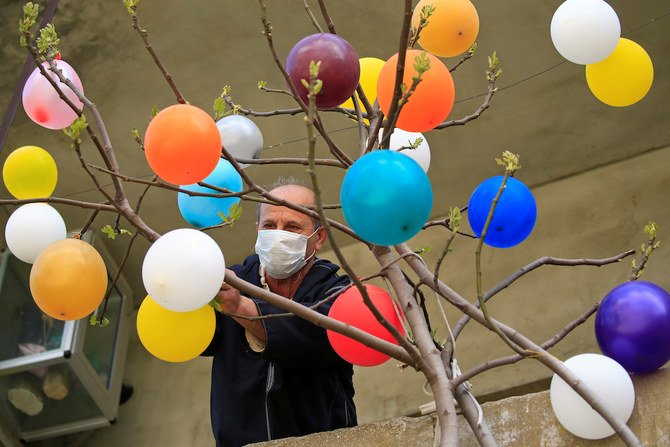
- ARAB NEWS
- 02 Jul 2025

Najia Houssari
BEIRUT: Lebanese President Michel Aoun abided by the government’s decision to enforce social distancing on Easter and did not attend the traditional mass held in Bkerke, the episcopal see of the Maronite Church in Lebanon.
Maronite Patriarch Bechara Al-Rahi performed mass with a few priests, which was broadcast on television.
Aoun called on the Lebanese people “not to give in to the culture of death and its repercussions.”
He added: “This shared suffering must bear the fruit of spiritual solidarity and effective values with which our country will be renewed to move forward, proud of all its people regardless of their affiliations, towards the horizons of life after having recovered from its pain.”
Lebanon enforced a curfew on Sunday to stop the spread of the coronavirus disease (COVID-19).
The Ministry of Health sent out awareness messages through traditional and social media, calling on people to stay home and warning of a fine of 50,000 liras ($33) in cases of violation.
Health Minister Hamad Hassan said that Lebanon is containing the pandemic given the non-dramatic daily rise in the number of COVID-19 cases.
The Ministry of Health announced in its daily report on Sunday 11 new confirmed cases, bringing the total number in Lebanon since the discovery of the first case on Feb. 21 to 630 cases.
69 percent of the cases are mild and moderate, while 22 percent have shown no symptoms and 9 percent are critical. A noticeable increase in the number of cases in the isolated town of Bsharri has been recorded. As of Sunday, the number of cases has reached 56, an increase of one new case.
The number of tests performed on people in Lebanon has reached 12,713.
The Ministry of Health highlighted that the tests performed on the Lebanese expatriates who returned on Saturday yielded negative results. These include 123 Lebanese people who have returned from Kuwait, 126 from Dubai, 148 from Lunda and 122 from Rome.
The ministry stressed that the returnees must commit to home quarantine and must be monitored daily by the ministry.
As in other countries, there is panic towards people who may have the disease, their families and those who were asked to self-isolate to make sure they have not caught COVID-19. Ostracism is affecting vulnerable groups.
A taxi driver, who is a Palestinian refugee in Tire, has undergone a test after his flu symptoms raised concerns in Burj El-Shimali camp. The Palestinian National Security Forces, the Palestinian Civil Defence, committees and the security forces transferred him to Al-Hamshari Hospital in Sidon, quarantined all members of his family, and kept track of all the people with whom he came in contact. The director of the hospital, Riad Abu Al-Einen, announced that the test result was negative, but the patient was asked to commit to home quarantine for 14 days and to have his health monitored daily.
Matn district in Mount Lebanon continues to be one of the areas with the highest number of cases, with the mayor, Marilyn Haddad, said that “the virus can infect any of us, so patients cannot be ostracized or treated in a negative way — this is to protect their human dignity.”
Haddad called on the residents of Matn to “look out for one another without causing harm” and to continue to perform humanitarian work under the slogan “together we serve without discrimination.”
Dr. Ahmed Al-Maghrabi, a psychologist and social health doctor, told Arab News: “COVID-19 has caused mass panic everywhere in the world that reaction to the disease is no longer innocent. People hear news of the disease killing 2,000 people per day. This causes panic and justifies it, but what cannot be justified is treating patients like killers. The epidemic is killing people, the patient is not.”
Al-Maghrabi added: “The blood of recovered patients is being used abroad to find a treatment, while we, on the other hand, run from people who were patients and recovered from the disease. People today are in the middle of the event and are not acting logically. The repercussions must be significant after the pandemic ends.”